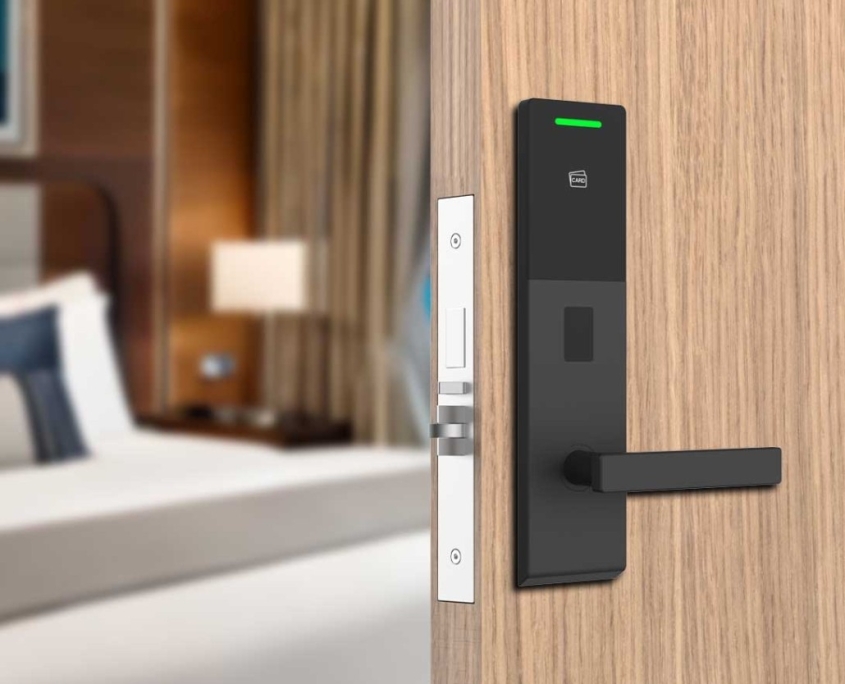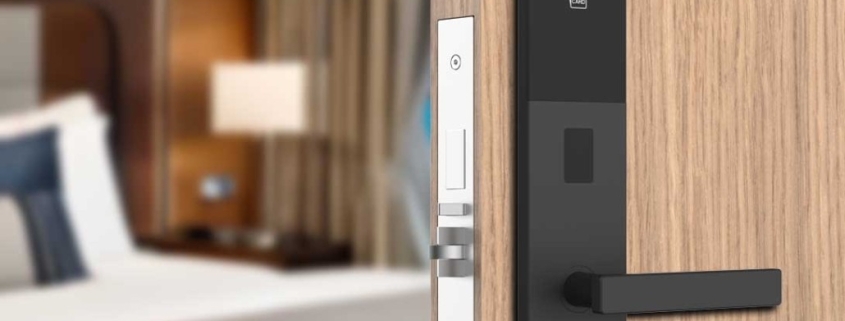What Kind of Door Locks Do Hotels Use?
When you check into a hotel, one of the first things you do is unlock your room door. But have you ever stopped to think about what kind of lock secures your space? Hotel door locks are designed for convenience, security, and durability, ensuring that only authorized guests can enter.
In this article, we’ll explore the different types of hotel door locks, how they work, and why hotels choose them. Whether you’re a frequent traveler or just curious about hotel security, this guide will give you a clear understanding of the technology behind your room key.
1. Traditional Key Locks (Less Common Today)
In the past, hotels relied on standard metal key locks, similar to those in homes. These locks required a physical key that would turn a mechanical tumbler inside the door.
Pros:
-
Simple and reliable
-
No need for electricity
Cons:
-
Keys can be easily lost or duplicated
-
Hotels must rekey locks if a key is lost
-
No audit trail (hotels can’t track who entered the room)
Due to these drawbacks, most hotels have phased out traditional keys in favor of more advanced systems.
2. Magnetic Stripe Key Cards (Common in the 1990s–Early 2000s)
Magnetic stripe (magstripe) key cards became the standard in hotels for decades. These cards, similar to credit cards, have a black magnetic strip that stores room access data.
How They Work:
-
The front desk encodes the card with your room number and stay duration.
-
You insert or swipe the card in the door lock to unlock it.
-
The lock reads the magnetic data and grants access if valid.
Pros:
-
Easy to reprogram for new guests
-
More secure than metal keys
-
Can be deactivated if lost
Cons:
-
Magnetic strips wear out over time
-
Cards can be demagnetized by phones or other magnets
-
Still somewhat vulnerable to hacking or cloning
While many hotels still use magstripe cards, newer technologies are replacing them.
3. RFID (Radio Frequency Identification) Key Cards
RFID key cards are now the most common type of hotel door lock. Instead of a magnetic strip, they use a tiny embedded chip that communicates wirelessly with the lock.
How They Work:
-
You simply tap or hold the card near the reader (no swiping needed).
-
The lock sends a radio signal to the card to verify access.
Pros:
-
Faster and more convenient than swiping
-
More durable (no magnetic strip to wear out)
-
Harder to clone than magstripe cards
-
Can be integrated with mobile keys (more on this later)
Cons:
-
Slightly more expensive than magstripe cards
-
Still requires carrying a physical card
Most mid-range to upscale hotels now use RFID locks for better security and guest experience.
4. Mobile Key Locks (The Future of Hotel Access)
Many hotel chains (like Marriott, Hilton, and Hyatt) now offer mobile key access via smartphones. Instead of a key card, you use an app to unlock your door.
How It Works:
-
You check in via the hotel’s app.
-
The hotel sends a digital key to your phone.
-
You hold your phone near the door lock, and Bluetooth or NFC unlocks it.
Pros:
-
No need to carry a key card
-
Can share access digitally with family/friends
-
Reduces front desk wait times
-
More secure (encrypted and tied to your phone)
Cons:
-
Requires a smartphone and app setup
-
Some guests still prefer physical keys
Mobile keys are growing in popularity, especially among younger travelers who prefer a seamless, tech-driven experience.

5. Biometric Locks (High-End & Futuristic Option)
A few luxury hotels and resorts are experimenting with biometric door locks, which use fingerprints, facial recognition, or even iris scanning for access.
How They Work:
-
At check-in, the hotel scans your fingerprint or face.
-
The lock recognizes you and grants entry without a key or card.
Pros:
-
Extremely secure (no lost keys or cards)
-
Fast and contactless
Cons:
-
Expensive to install and maintain
-
Privacy concerns (some guests don’t like biometric data collection)
While not yet mainstream, biometric locks may become more common in high-security hotels.
Why Do Hotels Use Electronic Locks Instead of Traditional Keys?
Hotels prioritize security, convenience, and operational efficiency, which is why electronic locks dominate the industry. Here’s why:
-
Enhanced Security: Electronic locks can be reprogrammed instantly if a key is lost.
-
Access Tracking: Hotels can see who entered a room and when (useful for security investigations).
-
Remote Management: Front desk staff can issue new keys without replacing physical locks.
-
Guest Experience: Mobile keys and RFID cards provide a smoother check-in process.
What Happens If You Lose Your Hotel Key Card?
If you lose your key card, the hotel can deactivate the lost card and issue a new one. Unlike traditional keys, there’s no need to change the lock.
Tips for Hotel Key Security:
-
Keep key cards away from phones (to prevent demagnetization).
-
If using a mobile key, ensure your phone is charged.
-
Report lost keys immediately to prevent unauthorized access.
Final Thoughts: Which Lock Is Best?
Most hotels today use RFID key cards or mobile keys because they offer the best balance of security and convenience. While traditional keys and magstripe cards are fading, biometric locks represent the next wave of innovation.
Next time you check into a hotel, take a moment to notice the lock—it’s more advanced than you might think!



